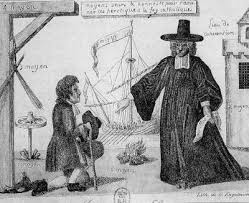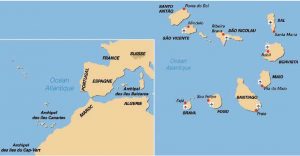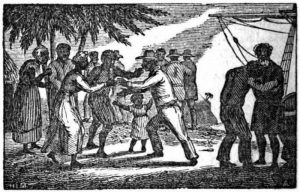 Two thousand Jewish children under the age of eight were deported in 1496 to the island of São Tomé in Africa.
Two thousand Jewish children under the age of eight were deported in 1496 to the island of São Tomé in Africa.
As early as 1496, the Spanish rulers forced Portugal to expel the Jews. Thousands of them, Spaniards and Portuguese, found “refuge” on the coast in Morocco, Algeria, Libya and Egypt for a large number, but also in the Portuguese counters of Cape Verde, São Tomé, Angola or Mozambique … The Cape Verde Islands will be the first territory invested by the Portuguese. In 1496, the King of Portugal, Manuel I took the decision to forcibly exile thousands of Jews in the islands of São Tomé, Principe and Cape Verde, the detainees sentenced to death, including new Christians (Jewish converts) and some children of the Marranos, from the Spanish Jewish communityterritory, whose age was between 3 and 14 years old.
Already in the 1460s, when the Portuguese discover the fourteen islands of Cape Verde, they use the archipelago as a refueling station on the road New World (India or America) as a stopover for the milking, where they refueled themselves (coal). The place will become a “refuge” for Jews whom the inquisition sought to convert under penalty of death in case of refusal. The first arrive on the main island of São Tiago.
In 1548, they are moved to the island of Santo Antao by the Inquisition. Some traces of their presence remain in the region, as evidenced by a village called Synagoga and several cemeteries. The forced settlement of the Jews marks the beginning of Portuguese colonization in Africa. We also find traces of a Jewish presence in São Tomé. The island was discovered in 1472, by two Portuguese sailors, Joao de Santarem and Pêro Escobar.
 In 1485, the King of Portugal will encourage the settling of settlers on these islands without men. In 1484, John II of Portugal, finding that the climate of the island was
In 1485, the King of Portugal will encourage the settling of settlers on these islands without men. In 1484, John II of Portugal, finding that the climate of the island was
so unhealthy, gave the Jews of his kingdom the choice of being baptized Catholics or colonizing São Tomé and marrying women brought from Angola “, written in 1864, explorer William Reade in his book “Savage Africa”.
King Manuel of Portugal, in search of funding for his colonial expansion, will also decide to impose heavy taxes on Jews. The majority do not failing to pay them, he exiled their young children in São Tomé and Principe in retaliation. Thus, two thousand young children under 8 will be separated of their parents and deported to these islands. This historical fact was considered “the first massive anti-Jewish deportation to Portugal” in the fifteenth century. This deportation served to populate the new African comptoir belonging to the Portuguese crown. Islands inhospitable because of the interest and reptiles. The objective of the Portuguese kings was to constitute a real empire by military, religious and economic conquest. But the first contacts established in Cape Town
Green and São Tomé had shown the inhospitable side of these places. The Cape Verde Islands were subject to winds and an endemic drought that prohibited profitable farming. As for that of São Tomé, it was quickly known as being “the lizard island” because of reptiles and giant crocodiles who populated it. But by its geographical location, it was an essential relay to organize expeditions to India, land of all wealth. Thus sugar cane and cocoa were introduced in São Tomé, making this archipelago the main producer of sugar. A culture that Requested a large workforce. During the sixteenth and seventeenth centuries, the crown pushed the Jewish merchants of Cape Verde to settle on the coasts of Guinea and Senegambia (current Senegal and Gambia) to trade in ivory, hides, gold and also slaves. These traders named lançados (to throw, “reject”) were often of Jewish origin. Most often, they took African wives and mixed with the local population.
 The Mavumba group in Cabinda, Angola, known for its potters, was considered a descendant of Jews expelled and deported to São Tomé. Between 1850 and 1900,
The Mavumba group in Cabinda, Angola, known for its potters, was considered a descendant of Jews expelled and deported to São Tomé. Between 1850 and 1900,
Jews settled in Angola and Mozambique, Portuguese colonies. The name of the capital of Mozambique was Lourenço Marquès, became Maputo at the independence of the country. Then there were counters where Jewish families settled, from Antwerp or Amsterdam. This exodus of Portuguese Jews to Africa was relayed by that of Jews of Portuguese origin settled in the Netherlands. The two movements are to distinguish:
the first was under duress, the second was voluntary. The Jewish community of
Netherlands is moving to develop a nascent trade between Africa and the nations most
economically powerful in northern and southern Europe. A second arrival of Jews in Cape Verde, fleeing most of the persecutions, took place in the nineteenth century, from Morocco and Gibraltar.
